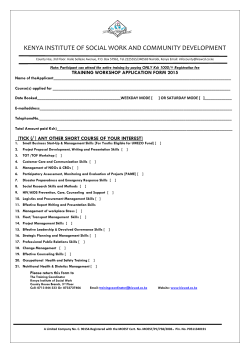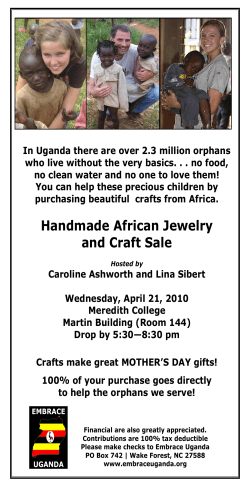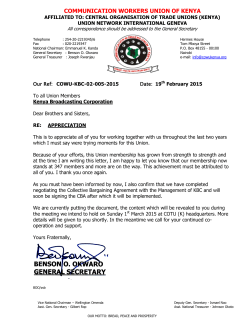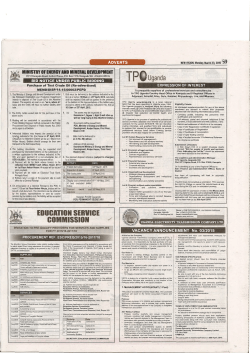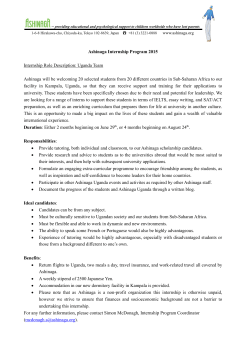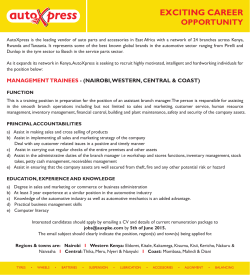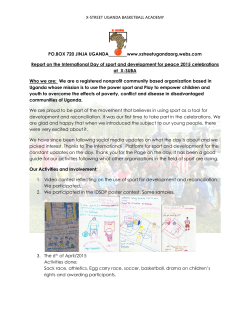
joint open letter and statem
KENYA SECTION|Since 1959 13 May 2015 Dr Jim Yong Kim President, World Bank Group 1818 H Street, NW Washington, DC Subject: joint open letter and statement in reaction to your speech in which you praised Bridge International Academies Dear President Kim, We are writing to express our deep concern about your recent speech, on 7th April 2015 titled “Ending Extreme Poverty by 2030: The Final Push,” in which you praised the for-profit, fee-charging chain of private primary schools in Kenya and Uganda, Bridge International Academies (BIA). Your remarks, in the context of a speech about poverty reduction, suggest that the World Bank believes this model should be supported and expanded through public policy, and that it is acceptable and desirable to expect poor people and communities to pay for basic education. The international community has fought to abolish school fees over the last two decades due to their negative impact on the poor, and their role in entrenching inequality. We are deeply troubled that this fee-based model is now being promoted as a means of ending poverty. In your remarks you argued that, thanks to these schools, “[a]fter about two years, students’ average scores for reading and math have risen high above their public school peers.” And you said these results are achieved for “just” $6 dollars a month. The underlying message is that $6 is a small amount of money worth paying for schooling; however, this suggests a lack of full understanding of the situation of poor people in our countries. 1 In fact, school fees at BIA range from $6.5 to $9, depending on the grade. Beyond this, other costs to families are substantial, including uniforms (about $18.5 per year), exam fees ($2 to $3 per term), textbooks, and payment transfers; a conservative estimate of the real monthly amount received by BIA for each child ranges rather between $9 and $13 a month – excluding food, which BIA provides for an additional $7 per month. These costs are either prohibitive or demand a significant sacrifice for many Kenyans and Ugandans. For the poorest half of Kenyan households who earn KES 7,000 ($75) or less per month, sending three children to a Bridge Academy would cost at least 24% of their monthly income, assuming a $6 monthly cost. Taking into account more realistic monthly costs of $17 that include school meals, the proportion rises to at least 68% of their monthly income. For 47% of Kenya’s population living below the poverty line – nearly half of the population – any expenditure to access education, even $6, means sacrificing another essential right for their survival, such as health care, food, or water. With nearly one out of six of Kenya’s primary school-aged children not enrolled in primary school, mostly due to cost factors, a model of expanding education based on charging school fees will continue to leave these children behind. In Uganda, the situation is similar. Half of Ugandan households earn USH 200,000 (about $68) per month or less, and 21% of households earn less than USH 100,000 ($34) per month. Thus, for half the Ugandan population, sending three children to BIA would represent 52% of their monthly income assuming a $6 monthly cost, and more likely around 75%, taking the more realistic figure of $17 a month – and around 150% for the bottom quintile of the population, who cannot even afford to buy enough food. Such an expense is inconceivable for this segment of the population. Charging fees will also exclude the 9% of children who currently remain out of school in Uganda, and it is bound to result in more school dropouts – as research shows that fees are the most common educational barrier cited by parents whose children drop out or never enrol in school. In your speech you also stated that students in Bridge Academies have better results than those in public schools. However, to-date we are not aware of any independent academic study available on Bridge Academies; it appears that the data you cited was from a study conducted by BIA itself. Other information about BIA schools calls into question these claims of higher quality. For example, teachers have only five weeks of training and rely on scripted, standardized lessons. Technology is a promising tool to improve learning, but it cannot substitute for a qualified teacher. If the World Bank is serious about improving education in Kenya and Uganda, it should support our governments to expand and improve our public education systems, provide quality education to all children free-of-charge, and address other financial barriers to access. However, the Bank has no active International Development Association (IDA) investments in either Kenya or Uganda’s public basic education systems, and neither does it have any such future commitments in the pipeline. In contrast, last year, the World Bank’s private sector arm, the International Finance Corporation, made a $10 million investment in Bridge International Academies to enable its expansion. It is alarming to see the World Bank Group supporting fee-charging, profit-making, private education instead of free, public basic education in Kenya and Uganda. Given the World Bank’s power to influence the development landscape, it is a worrying indication of future trends. Public primary education in Kenya and Uganda is, in law, free and mandatory. International human rights standards also require these countries to provide free quality education for all. The World Bank should work towards supporting countries such as Uganda and Kenya to put the laws into reality, and support public education systems. Attached is a short briefing, which explains our concerns in more detail. Only a month before your speech, members of civil society from several countries, including Uganda, met with senior education officials of the World 2 Bank specifically to discuss the rise of fee-charging, private primary schools, the World Bank’s support to them, and funding for BIA in particular. These civil society representatives were not just isolated voices but part of a global movement in support of the right to education, with strong concerns and deeply united positions on these issues. For this reason, we were particularly disappointed to hear your recent remarks. However, we understand that you are committed to dialogue with civil society and we are hopeful that you will consider and act on our concerns. In particular, we call on the World Bank Group to: Stop promoting the model used by Bridge International Academies and other fee-charging, private schools, and publicly re-commit the World Bank to universal, free and compulsory basic education. Cease investments in Bridge International Academies and other fee-charging, private providers of basic education. Re-establish World Bank investments in Kenya and Uganda’s public basic education systems. Refrain from basing its views on self-produced evidence from corporate providers of education, and instead base its policies on independent, rigorous studies assessing the impact of education models on the totality of the right to education, including on discrimination and segregation. Listen to and respond to the concerns of civil society, including by seriously taking into account their views when assessing and considering models such as that of Bridge International Academies and other feecharging, private providers of basic education. Signatory organisations Organisation 1. ActionAid International Kenya 2. ActionAid International Uganda 3. Civil Society Budget Advocacy Group 4. Community Restoration Initiative Project 5. East African Centre For Human Rights (EACHRIGHTS) 6. Elgon Benet Indigenous Organisation 7. Federation Of Women Lawyers – Kenya (FIDA Kenya) 8. Foundation for Human Rights Initiative 9. Girls Education Movement Uganda Chapter 10. Hakijamii 11. Initiative for social and Economic Rights 12. Kenya National Union Of Teachers (KNUT) 13. Kenya Youth Foundation 14. Kisumu Social Rights Association 15. Kituo Cha Sheria – Legal Advice Centre 16. Legal Brains Trust Uganda 17. Mathare Association 18. Mburugu & Kanyonge Associates Advocates 19. Muungano Wa Wanavijiji- (Federation of the Urban Poor) Country Kenya Uganda Uganda Uganda Kenya Uganda Kenya Uganda Uganda Kenya Uganda Kenya Kenya Kenya Kenya Uganda Kenya Kenya Kenya 3 20. 21. 22. 23. 24. 25. 26. 27. 28. 29. 30. National Union of Disabled Persons in Uganda Pan African development education and advocacy programme Rights Promotion and Protection Centre Soweto Forum The Eastern Africa Collaboration For Economic Social Cultural Rights (EACOR) The Kenya section of International Commission of Jurists (ICJ Kenya) Uganda National Teachers Union (UNATU) Uganda Society for Disabled Children United Organisation for Batwa Development in Uganda (UOBDU) Western Water and Sanitation Forum Women of Uganda Uganda Uganda / Nigeria Kenya Kenya Kenya Kenya Uganda Uganda Uganda Kenya Uganda Supporting organisations The following organisations signed the above statement in solidarity with organisations in Uganda and Kenya: Organisation 31. Action Paysanne Contre la Faim RDC 32. ActionAid International 33. Africa Network Campaign on Education For All (ANCEFA) Country Democratic Republic Congo International Africa region 34. 35. 36. 37. Albania United States Arab region Arab region Albanian Coalition for Child Education American Federation of Teachers (AFT) Arab Network for Civic Education Arabic Campaign for Education for All 38. Armenian Constitutional Right-Protective Centre" (ACRPC) Armenia 39. 40. 41. 42. 43. 44. 45. 46. 47. 48. 49. 50. 51. Regional – Asia-Pacific Morocco Australia USA Brazil Bangladesh Haiti Philippines Belgium Colombia Benin Cameroon Senegal 54. Coalition Nationale pour l'Education Pour Tous (CN-EPT/BF) 55. Coalition Nationale Togolaise pour l'Education Pour Tous Morocco Democratic Congo Burkina Faso Togo Asia South Pacific Association for Basic and Adult Education (ASPBAE) Attac/CADTM Maroc Australian Education Union (AEU) Bank Information Centre Brazilian Campaign for the Right to Education Campaign for Popular Education (CAMPE) Centre de Recherche et d'Action pour le Developpement Civil Society Network for Education Reforms (E-Net Philippines) CNCD-11.11.11 Coalición Colombiana por el Derecho a la Educación Coalition Béninoise des Organisations pour l’Education Pour Tous (CBO-EPT) Coalition camerounaise des ONG de l’Éducation (CEFAN) Coalition des Organisations en Synergie pour la Défense de l'Education Publique (COSYDEP) 52. Coalition Marocaine pour l’Education pour Tous 53. Coalition Nationale de l'Education Pour Tous en RDC Republic of of 4 56. Coalition nigérienne des Associations Syndicats et ONG de campagne Education Pour Tous (ASO-EPT Niger) 57. Confederação Nacional de Acção Sobre Trabalho Infantil 58. Conseil Régional des Organisations Non Gouvernementales de Developpement 59. Edmund Rice International 60. Education For All Sierra Leone 61. Education for all Somalia 62. Education International 63. Egyptian Center for Housing Rights 64. Egyptian Coalition for Education 65. Equal Education 66. Fédération Internationale des Ceméa (FICEMA) 67. Fédération Nationale des Associations de Parents d'élèves du Maroc (FNAPEM) 68. Foro por el Derecho a la Educación 69. Foundation For Environmental Rights,Advocacy & Development(FENRAD) 70. GCE Irish Coalition 71. GCE Italy 72. GCE Netherlands 73. Georgian Coalition for education For All 74. Ghana National Education Campaign Coalition 75. Global Campaign for Education 76. Global Campaign for Education, US (GCE-US) 77. Global Initiative for Economic, Social and Cultural Rights 78. Global Justice Now Niger 79. Human Dignity Regional - Africa 80. IBIS 81. International Accountability Project 82. International Trade Union Confederation (ITUC) International International International 83. International Union of Food, Agricultural, Hotel, Restaurant, Catering, Tobacco and Allied Workers Associations (IUF) 84. Jiwar éducation et développement International 85. 86. 87. 88. Jordan Nigeria Latin American region Latin American region Jordanian National Coalition Labour,Health and Human rights Development Centre Latin America and the Caribbean Social Science Council (CLACSO) Latin American Campaign for the Right to Education (CLADE) Portugal Democratic Republic Congo International Sierra Leone Somalia International Edypt Egypt South Africa International Morocco Chile Nigeria Ireland Italy Netherlands Georgia Ghana International USA International United Kingdom Morocco 89. Lumière Synergie pour le Développement 90. Mouvement Anfass Démocratique Sénégal Morocco 91. 92. 93. 94. 95. 96. Ivory Coast Regional – Africa India Cambodia Morocco Regional – Europe Mouvement Ivoirien des Droits Humains (MIDH) Mwalimu Nyerere Chair in Pan African Studies National Coalition for Education (NCE India) NGO Education Partnership (NEP) Organisation démocratique du Travail Organising Bureau of European School Student Unions (OBESSU) of 5 97. Organising Bureau of European School Student Unions (OBESSU) Regional – Europe 98. PREMICONGO 99. Privatisation in Education Research Initiative Democratic Republic Congo International 100. Public Interest Law Center (PILC) 101. Public Services International Chad International 102. Réseau des Organisations du Secteur Educatif 103. Réseau Ivoirien pour la Promotion de l'Education Pour Tous (RIP-EPT) 104. Right to Education Forum 105. Right to Education Project 106. Rukmini Foundation 107. Rwanda Education For All Coalition (REFAC) 108. SECTION27 109. Sudanese Collation for Education for All 110. Syndicat National Autonome de l’Enseignement Secondaire (SNAES) 111. The Bretton Woods Project 112. The Child Labor Coalition 113. The National Consumers League 114. urgewald 115. Vanuatu Education Policy Advocacy Coalition (VEPAC) 116. Yemeni Coalition For Education For All Niger Ivory Coast India International USA Rwanda South Africa Sudan Cameroon International USA USA Germany Vanuatu Yemen of 6
© Copyright 2026

